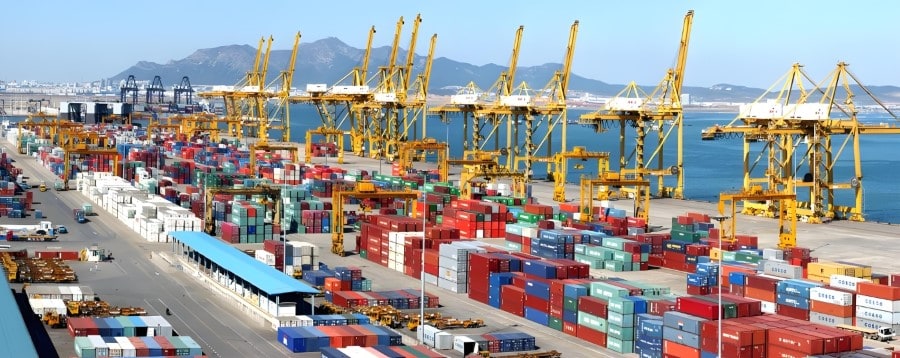In today’s interconnected global economy, import and export logistics play a crucial role in facilitating smooth international trade. From ensuring timely deliveries to optimizing shipping costs, managing the complexities of global trade is essential for businesses looking to expand their reach. With efficient import and export logistics, companies can minimize delays, reduce costs, and maintain seamless operations, allowing them to focus on growth and customer satisfaction.
In this blog, we’ll explore the key features of import and export logistics, offering insights into how mastering this vital aspect of global trade can help streamline your operations and boost business success.

1. Efficient Transportation and Freight Management
The backbone of any import and export logistics strategy is effective transportation and freight management. Whether shipping by sea, air, or land, choosing the right mode of transport is essential for balancing cost, speed, and reliability. Efficient logistics solutions optimize transportation routes and shipping methods to ensure timely delivery while minimizing the risk of damage or loss during transit.
Companies that offer advanced freight tracking systems allow you to monitor your shipments in real time, giving you better control over delivery schedules and enabling quick responses to potential delays or disruptions. Freight consolidation services are another key feature, allowing businesses to combine smaller shipments to lower transportation costs and improve shipping efficiency.
By mastering transportation logistics, companies can improve delivery times, reduce overall freight costs, and ensure that products reach their destination on schedule.
Key Transportation Features:
- Multiple shipping methods (air, sea, land) for cost and speed optimization.
- Real-time freight tracking for better control over shipments.
- Freight consolidation to reduce shipping costs.
- Route optimization to ensure timely delivery and efficiency.
2. Customs Clearance Expertise
Navigating the complexities of customs clearance is one of the most challenging aspects of import and export logistics. Each country has its own set of regulations, tariffs, and documentation requirements, and failing to comply with them can result in delays, fines, or even the seizure of goods. To streamline customs procedures, businesses often work with customs brokers who have specialized knowledge of international trade regulations.
These experts help ensure that all necessary paperwork—such as commercial invoices, bills of lading, and certificates of origin—are accurately prepared and submitted to avoid costly errors. Additionally, they keep track of tariff classifications and import/export duties, ensuring compliance with trade regulations and maximizing cost savings where possible.
With professional customs clearance support, businesses can prevent costly delays at the border and maintain smooth trade operations.
Key Customs Clearance Features:
- Customs brokerage services for efficient processing.
- Accurate documentation preparation to avoid delays and fines.
- Tariff classification expertise to reduce customs costs.
- Regulatory compliance to meet international trade laws.
3. Inventory Management and Warehousing
Successful import and export logistics also require effective inventory management and warehousing solutions. By integrating warehousing strategies with global supply chain operations, businesses can ensure that they have the right products in the right place at the right time. Strategically located warehouses can reduce shipping times and transportation costs, especially when goods are stored closer to key markets.
Modern warehousing facilities often incorporate advanced inventory management systems that provide real-time data on stock levels, enabling better forecasting and replenishment decisions. These systems help businesses avoid stockouts or overstocking, which leads to better cost management. Consequently, this improved efficiency results in more streamlined supply chain operations, allowing companies to respond quickly to market demands while minimizing waste.
For companies that deal with perishable or time-sensitive products, specialized temperature-controlled warehouses ensure product quality is maintained during storage, adding another layer of security to global trade operations.
Key Warehousing and Inventory Features:
- Strategically located warehouses for faster shipping.
- Real-time inventory management systems for efficient stock control.
- Temperature-controlled storage for sensitive goods.
- Integrated warehousing with global supply chain operations.
4. Optimizing Supply Chain with Digital Tools
Digital transformation is revolutionizing import and export logistics, offering companies the opportunity to optimize their supply chains using innovative logistics management tools. By embracing automation and data analytics, businesses can streamline their logistics processes, predict disruptions, and improve overall efficiency.
Supply chain management software helps companies automate processes like shipment scheduling, inventory tracking, and demand forecasting. These systems offer end-to-end visibility, enabling better decision-making based on real-time data. Furthermore, the integration of AI-powered algorithms helps predict potential supply chain bottlenecks, allowing for proactive adjustments to shipping routes or inventory levels.
With the right digital tools, companies can significantly reduce costs, improve delivery times, and create more agile and responsive supply chains.
Key Digital Optimization Features:
- Logistics management software for process automation.
- AI and data analytics for demand forecasting and disruption prediction.
- End-to-end supply chain visibility for better decision-making.
- Automated shipment scheduling to improve efficiency.
5. Risk Management and Compliance
Global trade involves a range of risks, from political instability to natural disasters and fluctuating exchange rates. To mitigate these risks, businesses need a robust risk management strategy integrated into their import and export logistics processes. Working with logistics providers who offer insurance options for international shipments is essential for protecting against potential losses.
Additionally, maintaining compliance with international trade laws and regulations is crucial for avoiding fines, delays, or disruptions. Companies must stay up to date with the latest trade agreements, export controls, and sanctioned country lists to ensure their goods can move freely across borders.
By focusing on risk management and compliance, companies can effectively safeguard their supply chains while avoiding penalties. Moreover, this strategic approach not only protects their reputation in international markets but also fosters trust among partners and customers. Consequently, prioritizing these elements is essential for ensuring long-term success and resilience in a competitive global landscape.
Key Risk Management Features:
- International shipping insurance for risk protection.
- Trade compliance services to ensure regulatory adherence.
- Regular updates on trade agreements and international regulations.
- Proactive risk management strategies for avoiding disruptions.
6. Sustainability in Global Logistics
As businesses across the globe focus on reducing their environmental impact, sustainability in logistics has become a top priority. Many companies are now embracing eco-friendly shipping methods to minimize their carbon footprint, such as opting for low-emission vehicles or shipping by sea to reduce fuel consumption compared to air freight.
Logistics providers also offer carbon offset programs, which allow businesses to invest in environmental projects to balance out their emissions. Additionally, optimizing transportation routes and leveraging green warehousing practices, like using solar energy or energy-efficient equipment, can further reduce the environmental impact of global trade.
By incorporating sustainability into their import and export logistics strategies, companies can meet customer expectations for greener operations while also reducing costs associated with energy consumption and waste.
Key Sustainability Features:
- Eco-friendly shipping options to reduce emissions.
- Carbon offset programs for environmentally conscious logistics.
- Green warehousing with energy-efficient solutions.
- Optimized routes to minimize fuel consumption.
Conclusion: Streamline Global Trade with Expert Import and Export Logistics
Mastering import and export logistics is essential for businesses aiming to thrive in the global marketplace. Specifically, efficient freight management, customs clearance, inventory optimization, and risk mitigation play crucial roles in contributing to smoother trade operations and improved profitability. Moreover, by leveraging the latest digital tools and ensuring regulatory compliance, companies can enhance their logistics processes. In addition, embracing sustainability will allow businesses to create resilient and agile supply chains that support their long-term growth. Ultimately, a comprehensive approach to logistics can position companies for success in an increasingly competitive environment.
For businesses ready to expand their global reach, partnering with a logistics provider that offers comprehensive solutions can help streamline operations and ensure successful international trade. Mastering these logistics strategies not only enhances efficiency but also provides a competitive advantage in the fast-paced world of global commerce.


